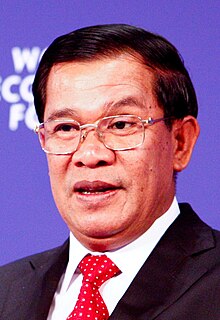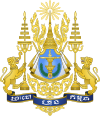Hun Sen
Hun Sen ហ៊ុន សែន | |
|---|---|
 Hun Sen speaking at the World Economic Forum in East Asia (2010) | |
| Prime Minister of Cambodia | |
| Assumed office 30 November 1998 | |
| Monarchs | Norodom Sihanouk Chea Sim (Regent) Norodom Sihamoni |
| Preceded by | Ung Huot |
| In office 1 May 1989 – 21 September 1993 Alongside Norodom Ranariddh: 2 July 1993 – 21 September 1993 | |
| President | Heng Samrin Chea Sim Norodom Sihanouk |
| Preceded by | Position established |
| Succeeded by | Norodom Ranariddh |
| Prime Minister of Kampuchea | |
| In office 14 January 1985 – 1 May 1989 | |
| President | Heng Samrin |
| Preceded by | Chan Sy |
| Succeeded by | Position abolished |
| Personal details | |
| Born | 5 August 1952 Peam Koh Sna, Indochina (now Cambodia) |
| Political party | CPP |
| Spouse | Bun Rany |
Template:Contains Khmer text Hun Sen (Khmer: ហ៊ុន សែន; born 5 August 1952)[1] is the current Prime Minister of Cambodia and leader of the Cambodian People's Party (CPP), which has governed Cambodia since the Vietnamese-backed overthrow of the Khmer Rouge in 1979. Since the restoration of multi-party democracy in 1993, the CPP has been in a coalition with the royalist Funcinpec party.
His current, full, honorary title is Samdech Akeak Moha Sena Padei Techo Hun Sen (Khmer: សម្តេចអគ្គមហាសេនាបតីតេជោ ហ៊ុន សែន). The title "Samdech" was attached to his name in 1993 by King Norodom Sihanouk. It is only an honorary title and does not give him further powers. He has a glass eye, the result of a wound sustained during the Khmer Rouge offensive against Phnom Penh in April 1975. Hun Sen is currently the longest serving leader in South East Asia and is one of the longest serving prime ministers in the world, having been in power through various coalitions since 1985.
Political career
Hun Sen came to power with the Khmer Rouge and served as a Battalion Commander in the Eastern Region of Democratic Kampuchea (previous name of Cambodia). After falling out with the Khmer Rouge Hun Sen fled to Vietnam. [2] Hun Sen was selected by the Vietnamese for a leadership role in the rebel army and government they were creating for Cambodia. When the Khmer Rouge regime was overthrown, Hun Sen was appointed as Foreign Minister of the Vietnamese-installed People's Republic of Kampuchea/State of Cambodia (PRK/SOC) in 1979 and in 1985 he was made Chairman of the Council of Ministers and Prime Minister, after the death of Chairman Chan Sy until 1990, (with a brief interruption from 1986 until 1987). As Foreign Minister, Hun Sen was a key figure in the Paris Peace Talks, which brokered peace in Cambodia.
In 1987, Amnesty International accused Hun Sen's government of torture of thousands of political prisoners using "electric shocks, hot irons and near-suffocation with plastic bags."[3]
From 1993 until 1998 he was Co-Prime Minister with Prince Norodom Ranariddh. Norodom Ranariddh was First Prime Minister and he was Second Prime Minister. However, the actual power resided in the hands of Hun Sen because most of the high officers in Cambodia including the military were CPP members which led Norodom Ranariddh to be jealous of his Co-Prime Minister and led to a power struggle, directly resulting in the July 1997 military conflict.
In 1997, the coalition was shaken by tensions between Ranariddh and Hun Sen. FUNCINPEC began to collaborate with the remaining Khmer Rouge rebels (with whom it had been allied against Hun Sen's Vietnamese-backed government during the 1980s), aiming to absorb them into its ranks.[4]
In response, Hun Sen launched the 1997 Cambodian Coup, replacing Ranariddh with Ung Hout as the First Prime Minister and himself still as the Second Prime Minister until the CPP's victory in the 1998 election and thus becoming the country's sole Prime Minister in 1998. During that year the media broadcast him as the Strong Man of Cambodia which he later said was premature, and that the July 1997 was merely, the government taking action against the paramilitary anarchy that was sponsored and brought to Phnom Penh by Norodom Ranariddh.
In an open letter, Amnesty International condemned the summary execution of FUNCINPEC ministers and the "systematic campaign of arrests and harassment " of political opponents.[5]
The elections of July 2003 resulted in a larger majority in the National Assembly for the CPP, with FUNCINPEC losing seats to the CPP and the Sam Rainsy Party. However, CPP's majority was short of the two thirds constitutionally required for the CPP to form a government alone. This deadlock was overcome and a new CPP-FUNCINPEC coalition was formed in mid-2004. When Norodom Ranariddh was chosen to be Head of the National Assembly and Hun Sen became again sole Prime Minister of Cambodia.
Corruption
Some political opponents of Hun Sen accuse him of being a Vietnamese puppet. This is due to his position in the government created by Vietnam while Cambodia was under Vietnamese military occupation and the fact that he was a prominent figure in the People's Revolutionary Party of Kampuchea (now known as the Cambodian People's Party), which governed Cambodia as a one-party state under Vietnamese military occupation from 1979 until elections in 1993. Hun Sen and his supporters reject such charges, saying that he represents only the Cambodian people.
Forced evictions and Sale of Cambodian land
Hun Sen's government has been responsible for the sale of land to foreign investors in 2007-08 resulting in the eviction of thousands of residents from their homes.[6]
Hun Sen was implicated in corruption related to Cambodia's oil wealth and mineral resources in Global Witness 2009 report on Cambodia. He and his close associates were accused of carrying out secret negotiations with interested private parties and taking money from those who he would grant rights to exploit the resources. However, the credibility of this accusation has been questioned by government officials and especially Prime Minister Hun Sen, himself.[7]
Personal life
Hun Sen is married to Bun Rany. They have six children, 3 sons and 3 daughters: Manet, Mana, Manit, Mani, Mali and Malis. The youngest, Malis was adopted. Hun Manet is a 1999 West Point Academy graduate and obtained his PhD in Economics at the University of Bristol. In 2010, Manet was promoted Major General in the Royal Cambodian Arm Forces (RCAF) and became the Deputy Commander of the Prime Minister's Body Guard headquarters.
Although Hun Sen's birthday is officially celebrated on April 4, 1951, he had revealed that his actual date of birth was August 5, 1952.[8] He had apparently lied about his date of birth to appear older when joining the Khmer Rouge as a youth.
See also
{{{inline}}}
Footnotes
- ^ Premier's Biography at the Royal Government of Cambodia Homepage; accessed 24 May 2009.
- ^ http://www.nytimes.com/1989/12/07/opinion/l-cambodia-s-hun-sen-is-himself-khmer-rouge-722489.html
- ^ http://www.encyclopedia.com/doc/1P2-8013822.html Cambodia is Said to Torture Prisoners, Boston Globe, June 4, 1987
- ^ Cambodia: Hun Sen and the 1997 Coup
- ^ http://www.hartford-hwp.com/archives/54/060.html Open letter to Second Prime Minister Hun Sen, Amnesty International, 11 July 1997
- ^ Cambodia, a country for sale, April 2008, The Guardian
- ^ http://www.globalwitness.org/media_library_detail.php/713/en/country_for_sale
- ^ The Cambodia Daily, April 5, 2007
Further reading
- Harish C. Mehta and Julie B. Mehta. 1999. Hun Sen: Strongman of Cambodia. Singapore: Graham Brash Pte Ltd. ISBN 981-218-074-5
- Elizabeth Becker. 1986, 1998. When the War Was Over: Cambodia and the Khmer Rouge. New York: Public Affairs. ISBN 1-891620-00-2
- Biography of Hun Sen Cambodia New Vision ~ newsletter of cabinet of Cambodia's Prime Ministerial office

